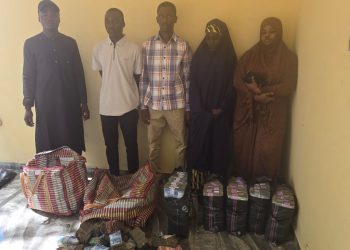By Nkechi Eze
In a strategic move aimed at deepening national preparedness against the growing threats of climate and weather-induced disasters, the Nigerian Meteorological Agency (NiMet) on Tuesday, June 3, 2025, received a high-powered delegation from the World Bank at its headquarters in Abuja. The visit marked a significant step forward in efforts to strengthen early warning systems and disaster risk management frameworks across Nigeria.
The World Bank delegation, led by Mr. Francis Samson Nkoka, Senior Disaster Risk Management Specialist, arrived in Nigeria as part of an ongoing mission focused on enhancing technical collaboration with key institutions engaged in climate resilience and emergency response. The mission builds on the foundation laid during earlier engagements held in January 2025 between the World Bank and the Federal Government of Nigeria, where discussions centered on establishing integrated strategies for climate risk reduction, institutional capacity building, and improved emergency coordination mechanisms.
In his opening remarks, the Director-General and Chief Executive Officer of NiMet, Professor Charles Anosike, who also serves as Nigeria’s Permanent Representative with the World Meteorological Organization (WMO), underscored the centrality of accurate, timely, and accessible meteorological information in building a resilient society. According to him, “Strengthening climate advisory services in Nigeria demands a holistic and multifaceted approach. It requires improvements in the accuracy and timeliness of data, tailoring information to meet local needs, and fostering deep collaboration with critical stakeholders.”
Professor Anosike further stressed the importance of technology-driven solutions, sustainable financing, and capacity development, noting that these elements form the backbone of any robust early warning infrastructure. “Our goal is not merely to forecast weather,” he said, “but to equip farmers, urban planners, health officials, and first responders with the information they need to make life-saving decisions. This demands continued investment in technology, training, and strategic partnerships.”
The World Bank delegation included a team of top-tier experts in the field of climate and disaster risk management, among them Mr. Oscar Ishizawa, Lead Specialist in Disaster Risk Management; Ms. Mary Elinor Boyer, Senior Specialist in Disaster Risk Management; Ms. Nathalie Andrea Wandel, Specialist in Disaster Risk Management; and Mr. Christopher Cameron Hann, a hydrometeorology consultant. The team engaged with NiMet’s leadership and technical staff in a series of briefings, discussions, and facility tours aimed at evaluating the Agency’s current capabilities and identifying areas for future collaboration.
During the guided tour of NiMet’s facilities, the visitors were given firsthand insight into the advanced meteorological and forecasting technologies employed by the Agency. From satellite-based observation systems to real-time data analytics used in producing climate bulletins and early warnings, the delegation was impressed by NiMet’s strides in modernizing its infrastructure. The World Bank representatives praised the agency’s dedication to delivering timely, science-based climate services that support both policy decisions and grassroots interventions.
“This is a critical time for countries like Nigeria,” said Mr. Nkoka during the visit. “We are witnessing an increase in the frequency and intensity of climate-related events—from flooding and drought to heatwaves and coastal erosion. Institutions like NiMet are on the frontlines, and our role at the World Bank is to provide the financial, technical, and strategic support necessary to ensure they can deliver life-saving services with even greater efficiency.”
The engagement reaffirms a growing alignment between NiMet’s strategic vision and the World Bank’s global commitment to climate adaptation, risk reduction, and sustainable development. It also signals an opportunity for Nigeria to benefit from expanded international support in the areas of hydrometeorological services, early warning dissemination, and resilience-building investments across vulnerable communities.
As Nigeria continues to face the cascading impacts of climate change, collaborations such as this signal a new phase of action-oriented partnership. Both institutions pledged to sustain the momentum by translating technical dialogue into implementable projects that will enhance national preparedness and safeguard lives, livelihoods, and infrastructure across the country.
The meeting concluded with renewed optimism and a shared determination to pursue lasting solutions that leverage science, technology, and institutional cooperation in protecting Nigeria’s future against the unpredictability of climate threats.















